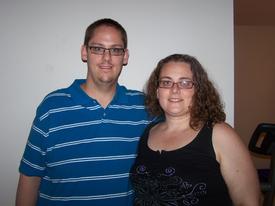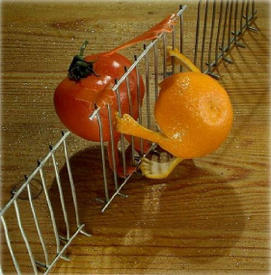Does cooking alter the calorie content of food?

roseymacdoo
Posts: 113 Member
Sorry if this is a dumb question, but does cooking (without adding any oil or anything) alter the calorie content of food?
eg if I know the calorie content of 250g of raw potatoes, then I boil them or bake them, would I record the same calories? Or If I know the calorie content of a portion of mince and I dry-fry it, would if still be the same?
Thanks
Rosey
eg if I know the calorie content of 250g of raw potatoes, then I boil them or bake them, would I record the same calories? Or If I know the calorie content of a portion of mince and I dry-fry it, would if still be the same?
Thanks
Rosey
0
Replies
-
See now thats a very good question. I know meat changes ounces when its cooked, usually drops an oz. Hopefully, someone has the answer. I usually go with after cooked amounts.0
-
I am not a nutrition expert, but I don't believe cooking any food changes it's caloric value. Cooking (the kind of cooking actually = frying vs steaming, etc.) can change the nutritional values, though. Also, anything you add to the food while cooking it, salt, other seasonings, etc. can impact the caloric intake - oil in the pan before you put the chicken in, etc. These are often hidden or forgotten calories that frequently don't get counted. But 4 ounces of chicken breast raw or cooked contain the same calories unless something else is added.0
-
With Potatoes, the 250g precooked, when you cook them you are just losing water so the weight would be less (would use precooked weight for cals)0
-
Cooking just about anything will take some of the moisture out and lower the weight of the thing. Also, what you cook it with/in may alter it's value. In most case though it's nominal.0
-
See now thats a very good question. I know meat changes ounces when its cooked, usually drops an oz. Hopefully, someone has the answer. I usually go with after cooked amounts.
I think it is actually water content that cooks out of the food when it is cooked rather than the meet actually changing in weight. I think that when the package indicates a calorie content - they are identifying the content of the raw meat - cooking doesn't actually change that, it may, however reduce the amount of water, thereby reducing the "actual weight of the food item." So, when you are preparing a meal, you weigh the meat i.e. chicken breast before you cook it - that is the amount of calories you would note as being consumed based on the packaged information provided for that particular weight of meat. i.e. the package states 1 serving is 3 ounces of chicken breast - with specific calories; you weigh out 3 ounces of chicken breast and cook it and the calories are still the same as they were before you cooked it unless you add oil, seasonings, etc.0 -
See now thats a very good question. I know meat changes ounces when its cooked, usually drops an oz. Hopefully, someone has the answer. I usually go with after cooked amounts.
I think it is actually water content that cooks out of the food when it is cooked rather than the meet actually changing in weight. I think that when the package indicates a calorie content - they are identifying the content of the raw meat - cooking doesn't actually change that, it may, however reduce the amount of water, thereby reducing the "actual weight of the food item." So, when you are preparing a meal, you weigh the meat i.e. chicken breast before you cook it - that is the amount of calories you would note as being consumed based on the packaged information provided for that particular weight of meat. i.e. the package states 1 serving is 3 ounces of chicken breast - with specific calories; you weigh out 3 ounces of chicken breast and cook it and the calories are still the same as they were before you cooked it unless you add oil, seasonings, etc.
But if you cook ground beef for example you are actually cooking fat out of the dish too which technically does change the content, but it wouldnt be measureable.
Chicken and pork etc are lean, you are right you are losing water0 -
it's a great question.
I think you have to compare the uncooked weight/calories of say steak to the cooked weight/calories of steak. Since steak shrinks likely a 4 oz piece of raw steak might equal a 3 ounce piece of cooked steak in calories.
Cooking DOES make a difference in how you COUNT the calories ... can't use a raw weight calorie count for a cooked product. There are different calories/ounce for uncooked vs. cooked.
In the case of boiling potatoes, I don't know if water is absorbed by the potato while cooking so I would go with the raw weight.
Does this help?0 -
Great question! I have wondered the same thing.
Go by the weight for meats, chicken, etc. before cooking or after for calorie count?
I usually go by the calorie count recorded in the database for how the item is cooked. Say broiled vs fried.0 -
Ooh very glad others feel the same way and it's not such a daft question after all :laugh:
I find it easiest to weigh the raw ingredients and track those. so for example tonight I cooked some homemade potato wedges - I cut some raw spuds into wedge shapes and weighed them out (200g), parboiled, then put in a roasting tin and tossed with a tsp of olive oil, some salt & pepper and a few chilli flakes and put in the oven until they were lovely and golden and crispy.
So for this I added 200g raw potatoes and 1tsp olive oil to my diary.
I had a little go on the 'My Recipes' bit of the website earlier and it looks like that works by just totalling up the nutritional info from the ingredients, so I guess I'm doing things the right way....
So to take this a little further, if I were to bake a cake, would I just total up the nutritional info of the ingredients eg 200g flour, 200g sugar, 4 eggs etc? Or does the 'chemistry' of the baking process alter the nutritional info? Is the end product simply a sum of it's parts, in nutritional terms?
Glad I've sparked off an interesting discussion! :blushing:
Claire0 -
Yeah, meat's a whole different thing. If you broil a steak, fat drips off as well as moisture (ever look at the drip pan on that George Foreman grill?), but a potato or any other vegetable just loses water, if anything. Pasta and rice gain water. In a strictly scientific manner, it might be true that food loses a couple of calories in the cooking (since a calorie is actually a measurement of energy/heat), but since we are not completely destroying the food and burning it to cinders, it doesn't change enough to make a difference to us.
So, except for meat (which can drip off fat, which is full of calories), you can add up the calories of all the raw ingredients and get the number of calories you are consuming. For meat, check the cooking methods to determine which choice to use. And for God's sake don't FRY anything!0 -
I just weigh all the ingredients before cooking and add those into here. I also add any oil etc that I use for cooking too. I do think its worth checking the calories on the items in this database as they don't always match the calories on the packets. Eg, if I use minced beef for anything then I always get the 5% fat (or less if I can find it) and I always check that the calorie content on the pack matches the one I choose here.0
-
I always use the raw, pre-cooked weights. Be aware - this is still vastly different than the frozen. Example, tonight I am making chicken. The recipe calls for 1/2 - 3/4 lb of chicken. So I measure out FROZEN 10 oz. Once it was thawed and I'd poured off all the frozen water/juice - 8.5 oz. (was checking to make sure it wasn't not enough chicken now, lol). While draining off meat fat while cooking can save you some fat, since it is immeasurable and varied based on the cut of meat and how much fat was on it before, I always just figure if I saved myself some fat - BONUS.
There's really no way to figure it out yourself and I don't trust user entries like "chicken, grilled" with the quantity of "1 piece." Mainly this is just me being persnickety and keeping in mind that I've encountered multiple entries for packaged food on the database the user felt the need to specify was "correct" in the title and then left off nutritional values like sodium - I guess cuz they weren't tracking them.
I'd rather not account for the dripped fat and overestimate my calories than underestimate and eat too much without knowing it.0 -
Jenny, I agree with you. I grill chicken on my stove top grill pan. I don't add salt or pepper or any seasoning and the calorie count for that chicken is INSANE (along with the sodium). 1 breast is not equal to the next portion sized. I look up the the chicken brand that i bought, cook the chicken then weigh it out to eat ... I suppose I will have to start doing that differently from now on. I do add ingredients like olive oil to my food diary and I probably over guess the amounts to be safe.
I will weigh out the raw meat next time I cook chicken and see what the difference looks like. Great topic0 -
That's a good question and I think you should, but how much I don't know..
For example if you have a frozen raw patty of sausage and cook it.. it renders a lot of fat out of it. And unless you drink it or add that rendered fat back into the meat.. it should drop the caloric count, right?
It'd be impossible to count accurately because people prepare their foods differently. My wife and I like sausage and bacon crisp, so we render it a little longer. I suppose I could pour that fat into a container and weight it and count 9 calories per gram (IIRC that's the caloric intake of fat)0 -
This article explains this really well.
http://www.livestrong.com/article/336835-why-do-caloric-counts-change-when-cooked/0 -
http://www.livestrong.com/article/336835-why-do-caloric-counts-change-when-cooked/
Copy & paste the link into your web browser to read the article.0 -
This is an interesting thread, and very educational. So if I'm understanding everyone correctly, if I have a chicken breast that is 4 oz while raw, I should reweight it after cooking it, and then record the calories of the cooked weight? Good to know!0
-
The components of food that contribute to the calorie count are protein, carbs, and fat. As others have mentioned, it is common to lose fat as a result of cooking because it liquifies. But, as far as protein and carbs, you aren't going to heat your food enough to break down the protein and carbs enough to lower the energy content. If anything, you will do the opposite by making the food easier to digest and therefore absorb.0
-
This is an interesting thread, and very educational. So if I'm understanding everyone correctly, if I have a chicken breast that is 4 oz while raw, I should reweight it after cooking it, and then record the calories of the cooked weight? Good to know!
From articles I have read, you log the info for raw chicken, 4 oz. any fat you lose is nominal and it retains all other calories/macros. Same for beef. For instance a quarter pounder is really about 3 oz cooked but I log 4 oz of raw ground beef at whatever fat% I used0 -
Ooh very glad others feel the same way and it's not such a daft question after all :laugh:
I find it easiest to weigh the raw ingredients and track those. so for example tonight I cooked some homemade potato wedges - I cut some raw spuds into wedge shapes and weighed them out (200g), parboiled, then put in a roasting tin and tossed with a tsp of olive oil, some salt & pepper and a few chilli flakes and put in the oven until they were lovely and golden and crispy.
So for this I added 200g raw potatoes and 1tsp olive oil to my diary.
I had a little go on the 'My Recipes' bit of the website earlier and it looks like that works by just totalling up the nutritional info from the ingredients, so I guess I'm doing things the right way....
So to take this a little further, if I were to bake a cake, would I just total up the nutritional info of the ingredients eg 200g flour, 200g sugar, 4 eggs etc? Or does the 'chemistry' of the baking process alter the nutritional info? Is the end product simply a sum of it's parts, in nutritional terms?
Glad I've sparked off an interesting discussion! :blushing:
Claire
Regarding the cake:
Measure before or after baking. It is the same either way.
http://www.newton.dep.anl.gov/askasci/chem03/chem03809.htm0 -
Thank you Grannypattibo!0
-
I have been wondering the same thing for a while.
I was able to find this article on the subject that is based on scientific research.
http://blogs.discovermagazine.com/crux/2011/12/08/why-calorie-counts-are-wrong-cooked-food-provides-a-lot-more-energy/#.VD2YJbB4qIR
The basic idea within it is that when food is cooked, it becomes more easily digested by your body. So if you eat a piece of raw meat, it will take your body a lot of energy to break it down and get the calories out than if you cooked that same piece of meat. Cooked meat and vegetables have already been broken down by heat so your digestive system can get more calories out of the food and digest it more efficiently.
Also, many vitamins cannot survive exposure to high heat over prolonged periods of time, so you should consider that for your micronutrient make-up.
However, I haven't been able to find a way of tracking how many real calories or vitamins you would be getting from food that is cooked v raw.0 -
I think the only thing significantly affected will be alcohol as boiling wine, say, in a braised meat dish will alter its molecular composition.0
-
I thought of another example where cooking would reduce calories. Heating up sugar to the point that it caramelizes also alters the chemical structure.0
-
Here. This article reads nothing like an article intended for people trying to lose weight, largely because it isn't. The answer is no, it doesn't make something have more calories, but yes, overall cooking will result in the body being able to use more of the calories that something has.0
This discussion has been closed.
Categories
- All Categories
- 1.4M Health, Wellness and Goals
- 398.4K Introduce Yourself
- 44.7K Getting Started
- 261K Health and Weight Loss
- 176.4K Food and Nutrition
- 47.7K Recipes
- 233K Fitness and Exercise
- 462 Sleep, Mindfulness and Overall Wellness
- 6.5K Goal: Maintaining Weight
- 8.7K Goal: Gaining Weight and Body Building
- 153.5K Motivation and Support
- 8.4K Challenges
- 1.4K Debate Club
- 96.5K Chit-Chat
- 2.6K Fun and Games
- 4.7K MyFitnessPal Information
- 17 News and Announcements
- 21 MyFitnessPal Academy
- 1.5K Feature Suggestions and Ideas
- 3.2K MyFitnessPal Tech Support Questions



















